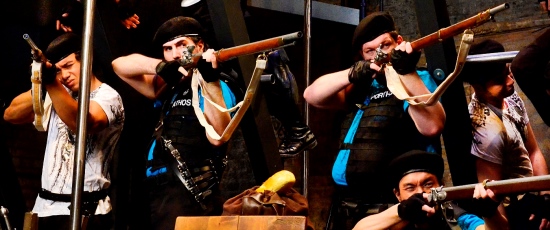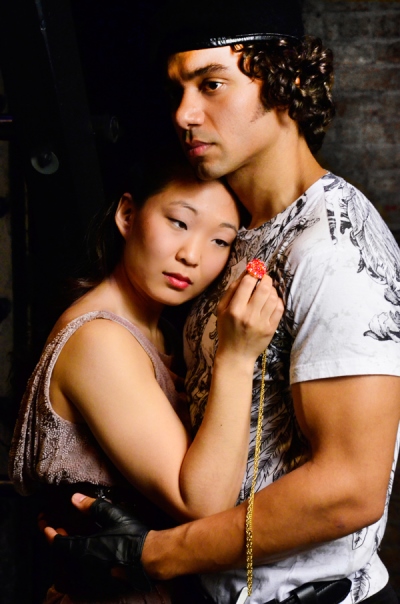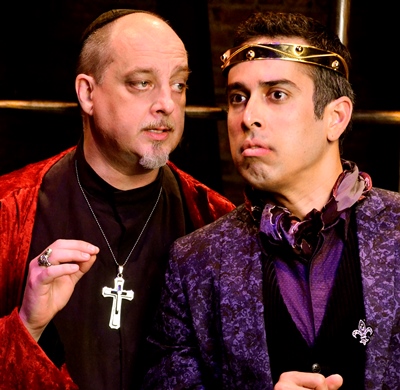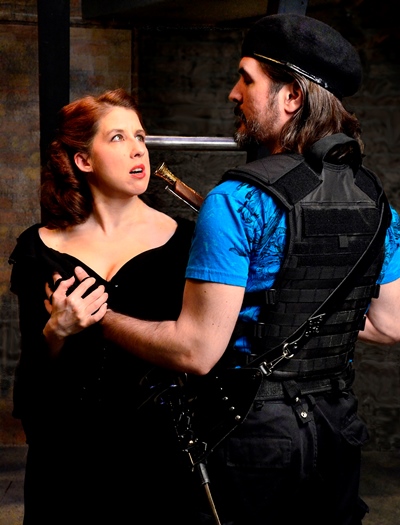‘The Three Musketeers’ at Lifeline: Acrobatics meet melodrama in a one-for-all free-for-all
 Review: “The Three Musketeers” by Alexandre Dumas, at Lifeline Theatre through July 21. ★★
Review: “The Three Musketeers” by Alexandre Dumas, at Lifeline Theatre through July 21. ★★
By Lawrence B. Johnson
If Alexandre Dumas’ historical novel “The Three Musketeers” is a romantic adventure of epic proportions, Lifeline Theatre’s adaptation for the stage is a busy amusement, a shrunken likeness that has its appealing features but falls well short of capturing either the bravura spirit or the inherent drama of the original.
 Dumas’ classic story, which first appeared serialized in 1844, concerns the exploits of d’Artagnan, a poor country lad in early 17th century France who goes to Paris in hope of joining the celebrated Musketeers, the royal guard of Louis XIII. There, d’Artagnan finds more than he bargained for. Besides the guardsmen, whose number includes three close pals and valiant soldiers known as Porthos, Athos and Aramis, the ambitious youth gets a heady dose of political intrigue, shady characters, lethal plots and, of course, love.
Dumas’ classic story, which first appeared serialized in 1844, concerns the exploits of d’Artagnan, a poor country lad in early 17th century France who goes to Paris in hope of joining the celebrated Musketeers, the royal guard of Louis XIII. There, d’Artagnan finds more than he bargained for. Besides the guardsmen, whose number includes three close pals and valiant soldiers known as Porthos, Athos and Aramis, the ambitious youth gets a heady dose of political intrigue, shady characters, lethal plots and, of course, love.
Despite the title, “The Three Musketeers” is really d’Artagnan’s story, though his vicissitudes quickly become bound up in the swords, pistols and personal issues of that trio who live by the motto of “all for one, one for all.” In all matters of derring-do, political risk and the heart, the threesome soon becomes a foursome.
Lifeline’s principal characters offer an agreeable core of performances, led by Glenn Stanton’s handsome, eager and bold d’Artagnan. He’s in good company with Chris Hainsworth’s Athos, Christopher M. Walsh’s Porthos and Dwight Sora’s Aramis. The four actors create individualized portraits as men with checkered histories and quite human aspirations. And director Amanda Delheimer Dimond allows dramatic space for us to get to know and care about this lusty quartet.
 That said, by the time this adaptation by Lifeline ensemble member Robert Kauzlaric has excised, contracted, revamped and thinned Dumas’ tale to fit within the theater’s modest stage and two hours’ time, what should be epic becomes merely frantic, a headlong plunge from scene to scene. The exigencies of distillation loom as large as the as the propelling elements of the story itself.
That said, by the time this adaptation by Lifeline ensemble member Robert Kauzlaric has excised, contracted, revamped and thinned Dumas’ tale to fit within the theater’s modest stage and two hours’ time, what should be epic becomes merely frantic, a headlong plunge from scene to scene. The exigencies of distillation loom as large as the as the propelling elements of the story itself.
This miniaturized extravaganza also suffers from a surfeit of swordplay — though it appears a wound is inflicted but rarely. One can only admire fight choreographer Matt Hawkins’ ability to cram the stage with so many rapier-brandishing bodies. Still, as the king’s musketeers and the rival personal guard of his prime minister, Cardinal Richelieu, take to fighting at the least provocation, the measured mayhem feels more acrobatic than combative.
Which brings me to Alan Donahue’s gymnasium-like set, on which everyone, male and female, seems to have a turn at swinging from a high bar or sliding down a long pole. This is physical theater at its most eye-popping, and like all that frenetic clashing of swords, more action than inspiration.
 Lost amid this hurly-burly of concision are some of Dumas’ finer political points, notably why Cardinal Richelieu – a slyly menacing performance by Sean Sinitski that belongs in a better play – wishes to steer Louis XIII into war with England. Louis, historically a stutterer, is depicted in Miguel Nunez’s performance as barely competent, a foppish fool.
Lost amid this hurly-burly of concision are some of Dumas’ finer political points, notably why Cardinal Richelieu – a slyly menacing performance by Sean Sinitski that belongs in a better play – wishes to steer Louis XIII into war with England. Louis, historically a stutterer, is depicted in Miguel Nunez’s performance as barely competent, a foppish fool.
Of the several men in supporting roles of greater or lesser importance, I will say only that they dispatch their work with a collectively unremarkable aspect. They are a wooden lot.
Dumas’ women run the gamut from royalty to rogue. Drawing the dubious assignment of Kauzlaric’s condensed Constance Bonacieux — seamstress to the queen, object of d’Artagnan’s ardor and ever imperiled — Deanna Myers suffers benignly as a character reduced to cardboard. Katie McLean Hainsworth plays the nefarious Milady de Winter, ally of Richelieu and ruthless schemer with a shadowy past. If there’s more than a touch of melodrama in Hainsworth’s cold-blooded machinations, the complexity of her extended final scene makes up for it.
Would that the Kauzlaric-Dimond treatment of “The Three Musketeers” displayed more moments of such tactile drama. And yet the production does end well, as if in a freeze-frame of unresolved circumstance – with Stanton’s now worldly d’Artagnan having gained more than he ever dreamed of and finding himself more alone than he could ever have imagined.
Related Link:
- Performance location, dates and times: Details at TheatreinChicago.com
Tags: Alan Donahue, Alexandre Dumas, Amanda Delheimer Dimond, Chris Hainsworth, Christopher M. Walsh, Dwight Sora, Glenn Stanton, Katie McLean Hainsworth, Lifeline Theatre, Mark Hawkins, Robert Kauzlaric, Sean Sinitski

